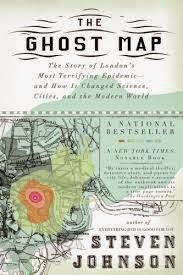The Ghost Map: The Story of London's Most Terrifying Epidemic and How it Changed Science, Cities, and the Modern World—Steven Johnson
On the twenty-eighth of August, all the changed. At around six a..m., while the rest of the city struggled for a few final minutes of sleep at the end of an oppressively hot summer night, the Lewis infant began vomiting and emitting watery, grene stools that carried a pungent smell. Sarah Lewis sent for a local doctor, William Rogers, who maintained a practice a few blocks away, on Berners Street. As she waited for the doctor's arrival, Sarah soaked the soiled cloth diapers in a bucket of tepid water. In the rare moments when her little girl caught a few minutes of sleep, Sarah Lewis crept down to the cellar at 40 Broad and tossed the fouled water in the cesspool that lay at the front of the house.The timing of my reading of this book seems especially poignant with the pretend threat of a catastrophic Ebola outbreak (when in reality, scientists and doctors have said it's serious but unlikely to become an epidemic); however, I started reading it before the Ebola craze had reached its zenith and the realities in this book just make the current rhetoric even more outrageous.
That is how it began. (22)
The book explores the 1854 outbreak of cholera in a small working class neighborhood of London. Johnson artfully weaves together the story of the disease, the advancement of medical understanding as a result of this particular outbreak, and the personalities who made such monumental discoveries about the nature of the disease that they essentially eradicated future outbreaks in London.
Cholera was a huge issue for folks up to this point, and especially in large metropolitan areas. London had experienced so much population growth in the twenty years prior to this particular outbreak that there were more people living per square mile than the amount of people living per square mile in New York City today. Unfortunately, nobody had really considered the infrastructure to support such an influx of human beings, and all the things that they bring with them, including but not limited to human waste. (Sidenote: definitely don't read this book if you're squeamish about bodily fluids, because there is A LOT about poop. A lot. So fair warning.) Now we know that cholera is caused by a virus that lives in human waste, and it was a big problem back then because waste water and drinking water was all ending up in the same place. Nobody had any realistic idea of the true nature of the disease.
The "hero" of the story is a physician named John Snow (presumably no relation to his Game of Thrones counterpart). During this Victorian era, he was exceedingly well-known as an anesthetist, positing that different amounts of anesthesia created different levels of drowsiness. As crazy as it may sound at this point, around mid-1800's, the understanding of the nature of medicine was astronomically different; before some of Snow's investigations and experiments with anesthesia, physicians would often just guess at how much they should give to someone in order to perform a given procedure. To be fair to them, this was in itself a huge step from the days of absolutely no anesthesia when folks would just get good and drunk before going in for an amputation. Snow became such a well-known anesthetist that he was even personally requested by Queen Victoria to assist with the birth of one of her children.
After experimenting and developing the field of anesthesiology, Snow turned his attention to the overwhelming number of folks dying the awful, accelerated deaths from cholera. While Snow was amazing and groundbreaking in many ways while spearheading his investigation of cholera, it was also a bit of an alignment of the stars. Had a local coroner not recently started tracking cause of deaths (pretty much unheard of before he began) then Snow wouldn't have made some of the deductions about cholera that he did. If the Reverend Henry Whitehead—who lived in that particular London neighbourhood and knew the consituents remarkably well—hadn't been there to provide his insight, Snow might not have been able to reach the conclusions that he did.
When Snow first set forth his theory to the scientific community that he thought cholera was transmitted through water rather than airborne, people ridiculed him much the same way that Galileo was ridiculed for thinking that the earth went around the sun. Yet still he pursued his theory with gusto, because he was certain that he was right, and he was certain that he could help prevent cholera outbreaks in the future.
One of the remarkable things about this book that I think is not true of many history books is that Johnson didn't just recreate the neighbourhood and investigations of John Snow and Henry Whitehead—he also took the time to ponder and long-lasting effects of their discoveries, as well as posit how life might have been different had they not figured out the nature of cholera.
I obviously think it's a really interesting book, or I wouldn't have summarized quite so much. Also, it's easier to summarize a nonfiction book because there are no spoilers. Or maybe there are. Spoiler alert: Cholera is easily avoidable now, partly due to the care and attention shown to the problem almost two centuries ago by men like Snow and Whitehead. Spoiler alert: There are still hundreds of thousands of cases every year in countries where they don't have access to clean drinking water. If you're interested in helping to support a community acquire clean drinking water, there are some really great charities and NGOs that do so. charity: water is one of them. It's super easy to give a little to help a lot.



Comments
Post a Comment